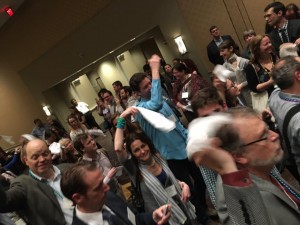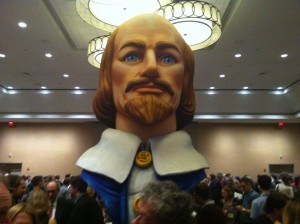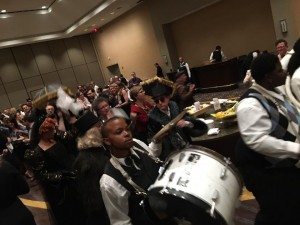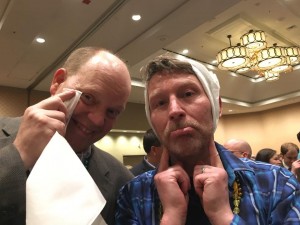My head’s still spinning from a glorious NOLA SAA, which finished early on Easter Sunday with a turbulent flight back to JFK that gave me one last unsettling tap on the shoulder. Who’s there?
Not…this big & bald guy who wrote some old plays?
I love pagan rituals and jazz funerals, but my SAA this year was about all about community — which means many things at our annual gathering, but for me especially this year it meant Seminar #51, the last one in your program. “Shared Practices and Shakespearean Communities,” was co-chaired by me and Matt Kozusco, with expert responding by Ayanna Thompson, Peter Holland, and Rick Godden. What a ride it was! Still bumping along in the jet stream of my thoughts.
Despite the thrills of seminar-ing, the culinary and biblious pleasures of New Orleans, a blazing set of paper sessions, and some positive steps toward completing the labors of the #shakeass17 Program Committee (marching into Atlanta next year!), my SAA’s undersong wasn’t all smooth. News from back home in CT undercut my contentment. While I was away, my daughter’s year-old injury flared back up. (Last year her foot was run over by her baby-sitter’s car when pulling out of our driveway, generating a long-running paroxysm of parental guilt I suspect many will recognize.) Alinor, solo parenting while I feasted, got sick. My son had his first week back to school after break. I was unhappily part of the community of fathers who weren’t there for their families on Easter morning.
Thesis #1 (which I didn’t quite spit out in the seminar): Communities are groups to which we can never fully belong, because we always fail them, some of the time.
We had a diverse bunch of papers: four historicist studies, three new media analyses, and three portraits of contemporary performance groups. After plenty of detailed textual responses before the conference, we wanted our two hours in NOLA to start something new. So we invented a party game:
Name two communities in which you are an active member, and one from which you are barred from membership.
Mine were straightforward, though also impermanent: I’m a parent of teenagers and an early modern ecocritic. I was amazed at the multiplicity of the different groups in which people claimed membership: Notre Dame football fans, black Shakespeareans, surfers, non-tenure track faculty, actors, St Louis Cardinal fans, hikers, people who speak more than three languages, atheists, soccer coaches, curlers. Shakespeareans was the unspoken common referent, though I’d intentionally spiked our punch with two brilliant medievalists, Jonathan Hsy and Rick Godden, who spoke eloquently about being near but not of Big Will.
From what were we excluded? Playing baseball, tenure, teaching Shakespeare classes (some of us teach other things), living less than 2,000 miles (!) from family, the Catholic church. We talked about exclusion by choice or by fiat, which leads me to my second not-quite-expressed thesis/conclusion:
Thesis #2: We have less choice in communal identities than we like to claim. When we speak of choice, we are engaged in hiding community’s costs.
Maybe my theses and their mostly invisible sources in domestic unease make me sound churlish? My main role in the seminar room, as I remember it, was to insist on the productive laboring force of communities, which can create things that individuals cannot. The constant chorus of our session was thinking about the SAA: we compared it (favorably!) to RSA; thought about its differential points of access, including for medievalists and working-class academics; even discussed a controversial lunchtime speech of a few years ago. Maybe it was being on the Program Committee and so seeing the full spread of next year’s options, but I was struck this year more than usually by the swirl of SAA, its vectors and diversities.
Communities are of necessity both inclusive and exclusive. Barriers to entry can be structured with clear routes of access but always remain visible, if only to facilitate the “shorthand” of shared knowledge that Peter Holland described in our seminar. That shorthand is also unevenly accessible, as our medievalists, scholars of color, and non-tt faculty emphasized. How much, I wonder, does open recognition counter barriers to access?
One answer appeared in the great moment at the Scholars of Color social in which Ayanna stood on a chair (or table, I couldn’t really see) and made visible the community of scholars of color in order to introduce them — or encourage them to introduce themselves — to other named communities, including SAA officers, Folger Library staff, and editors of journals. It felt like an implicit answer to some of the seminar’s questions, as well as a hopeful sign for the future of the SAA.
Two hours of conversation seldom leads to tidy conclusions, but I feel as if the seminar showed at least one new thing to me, and perhaps also to others: thinking explicitly about community both inside and beyond our scholarly work makes its shapes and contours visible. That visibility puts us in a position to create positive change.
Which leads me to my last unstated thesis, a partial rebuttal of the second:
Thesis #3: Communities are tools for creating new knowledge. Like language or the iphone in my pocket, these tools afford some forms of knowing and discourage others. The best purpose of communities is to extend the power and range of our knowing.
That’s a practical claim, and it omits the real & tangible pleasures of communal belonging in favor of an outward-directed interest in making new things. I love belonging as much as the next SAA addict, and I suspect my focus on knowledge creation is a partial shield for more selfish pleasures.
One feature of SAA as a community that received garish exaggeration this year is our cultish devotion to a single individual, White and Male and Old and Bald (like me). Shakespeare’s “deathaversary” (to borrow Miriam Jacobson’s nice formulation in the introduction to her stunning paper) saw us dancing around his effigy in the company of professional mourners and a jazz funeral. It was silly & fun & allegorical — surely we can all admit that much? One tension in community-making remains that it’s hard to stay individuated within large groups — it’s not easy to be, in Coriolanus’s terms, “author of myself,” while dancing around Shakespeare’s head to New Orleans jazz rhythms with our once-a-year conference besties. Might we Shakespeareans be less authorial and authoritative than we like to claim? Might the face of our collectivity — that grimly famous but still opaque visage — speak us as much as we attempt to distinguish ourselves?
I’m home now, and I think mostly forgiven my treacherous absence in a time of need. But I’m still thinking (and blogging!) about SAA, including the many things that, despite my 5-day stay in NOLA (a conference record I aim not to repeat soon), I missed. Wendell Pierce’s talk, the paper session with Amanda Bailey, Julian Yates, & Ben Robinson (I went to its chronological rival, with Kim Coles, Drew Daniel, and Katherine Eggert: choices!), Erika Lin’s session on Mardi Gras Shakespeare. One can’t be everywhere, as this past week has re-taught me. Belonging is aspirational, impossible, costly. To recap my contradictory theses: we can’t join, joining costs, we must join to build and change.
See everyone in Atlanta next year!



[…] there have been some useful reflections written on SAA 2016 already. Steve Mentz has written about communities; Joeseph Wallace has written about specialisms. I think it’s […]